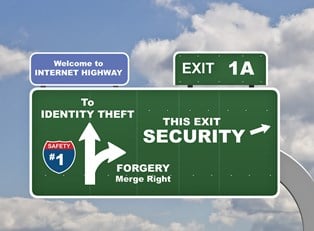Identity Theft is Extremely Expensive
Identity theft caused total losses of $15.4 billion in 2014. But that's actually an improvement over 2012 when it cost Americans $24.7 billion. And while most people find the issue resolved within a day, others may find that their struggle drags on for years.
And then there are the other financial considerations that go into reacting to identity theft, and trying to prevent it. There's the money that people spend on prevention services. Or the $6.75 billion that it cost to replace all of the point-of-sale terminals in America with chip card-compliant ones. All in all the transition may cost $33 billion when it's all said and done. In the meantime, credit card fraud costs 13 cents out of every $100 spent in the U.S.
Then there is the cost of other initiatives to fight identity theft, like the Ohio identity confirmation quiz that many people thought was, in itself, fraudulent. Think about that. Government employees had to brainstorm that letter, draft it up, edit it, disseminate it, create web page FAQs to deal with questions about it, and even then law enforcement had to deal with 40,000 concerned phone calls generated by the letters. Then even more state time and money went into examining the quiz and altering it in light of the complaints.
Did you know...
- There are over 1.6 million automated teller machines around the world. And that really does mean the entire world. There are even two ATMs on Antarctica at McMurdo Station operated by Wells Fargo. Friday is the most popular day that ATMs are used worldwide, and the average withdrawal is around $80.
- Paper money is actually pretty heavy. One pound would be worth $454 in $1 bills. That means $1 million comprised solely of $100 bills would weigh over 20 pounds. Those suitcases filled with money in movies must be hefty to lug around all that paper money. If you plan on robbing a bank, you better bulk up!
- When it comes to counterfeiters, North Korea are pros. They have gotten so good at counterfeiting American currency (particularly the $50 and $100 bills) they their fakes are known as "superdollars." They require specialized Federal Reserve equipment to be identified. There are $45 million worth of North Korean fakes…that we know of.
- Want a money saving tip? Ditch credit and debit cards, and stick to carrying around cash. Studies show people spend between 12 – 18% more when using a plastic card as opposed to when paying for things in cash. If you physically have to dole it out, you’re much more aware that you are spending your hard-earned money!
- The most expensive hotel room in the world (the Royal Penthouse Suite at the Hotel President Wilson in Geneva, Switzerland) costs $83,200 a night. That's $58 per minute for a stay! Good thing it has 12 bedrooms, 12 baths, a wraparound terrace, a Steinway piano, and an assigned private staff (including a chef)!



